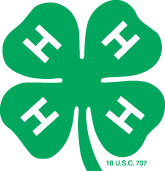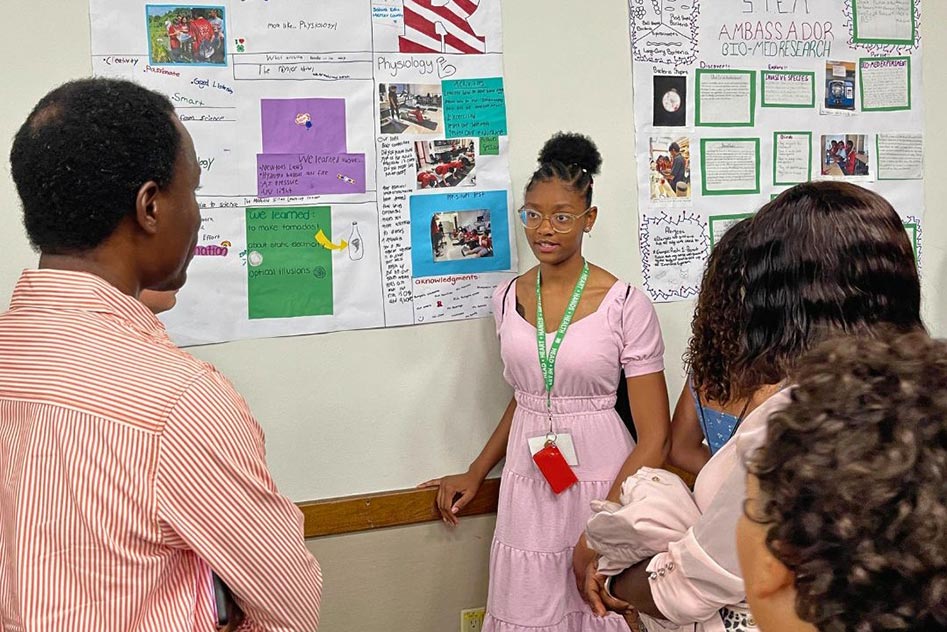
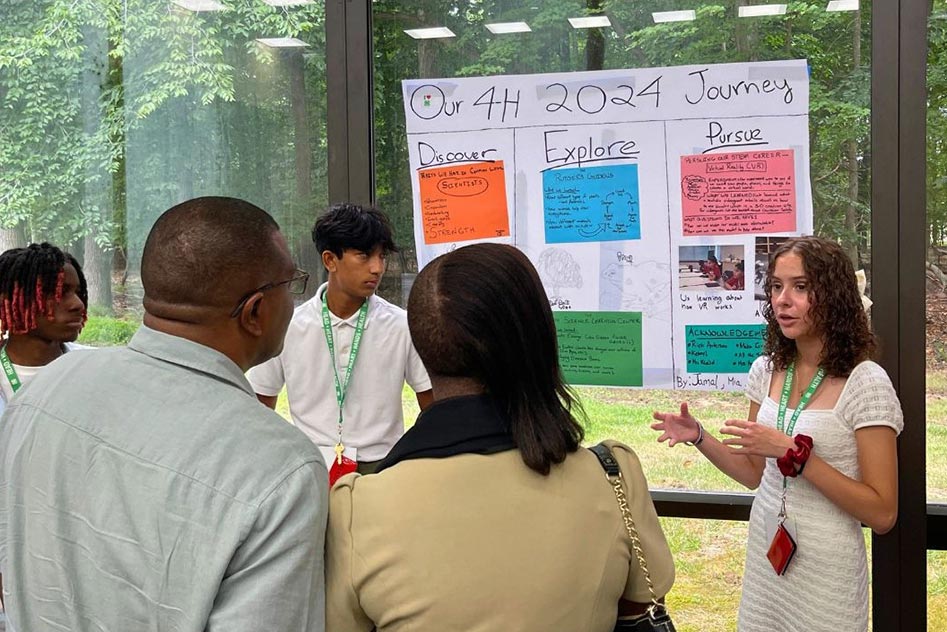
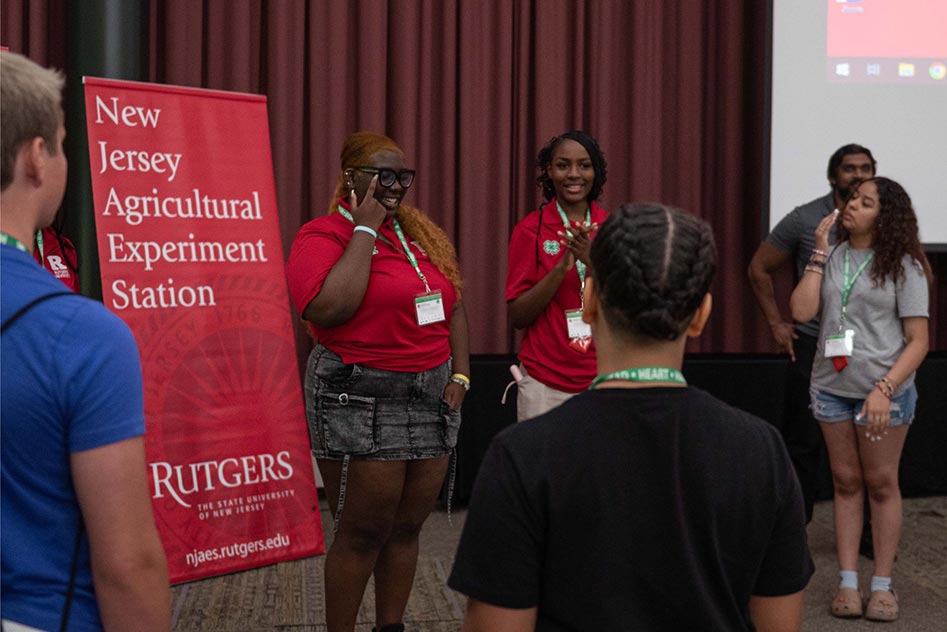
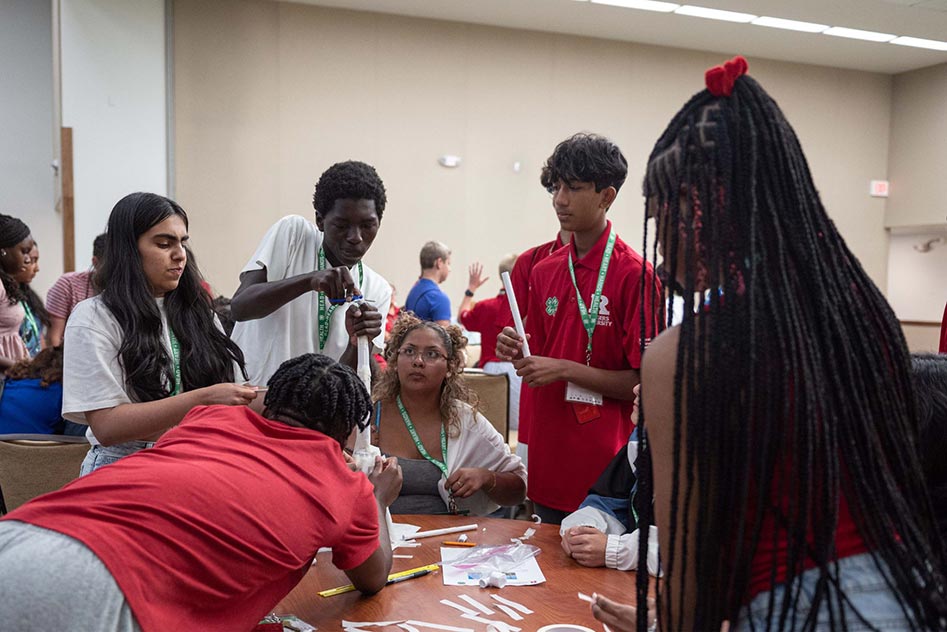
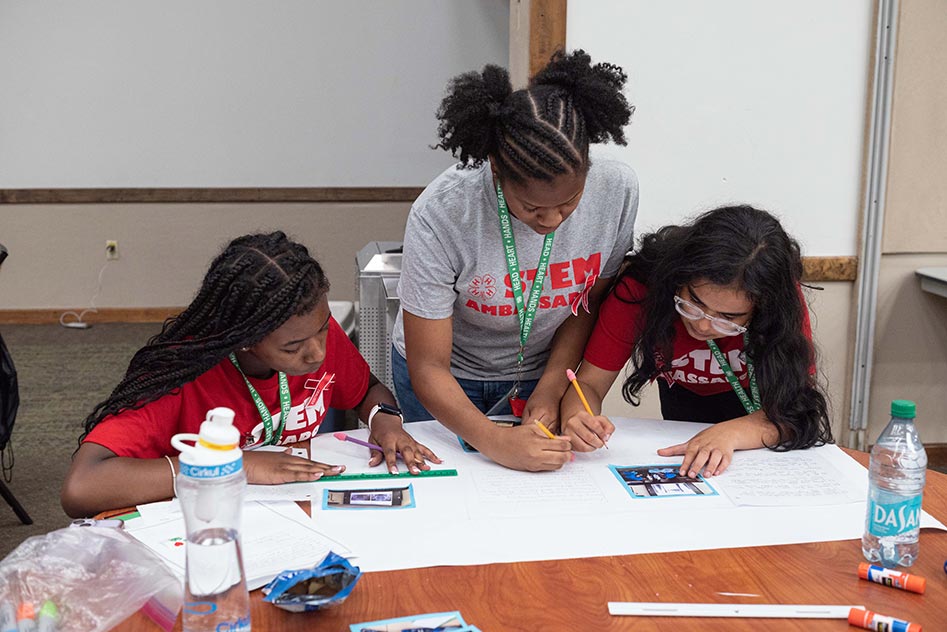

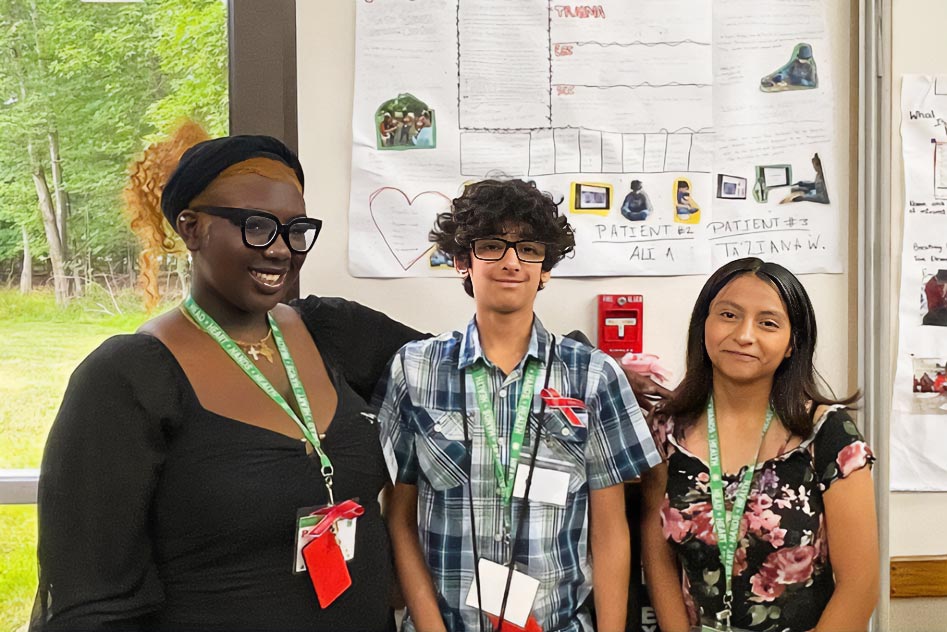
Returning STEM Ambassadors
As a special treat, we asked all of our returners about their thoughts on returning, what STEM (Science, Technology, Engineering, and Math) means to them, and what they are hopeful about now that they've come back!
We've compiled their answers here, summarizing for clarity, length, and context.
From Middlesex County, here's Sathvik!

During the week, he worked with Rick Anderson and Kenny Chen to investigate Virtual Reality (VR). Sathvik sees this technology as the future. During this investigation, he learned how to use his phone to scan objects into virtual reality and 3D print a scanned object.
What does it mean to you, to be returning?
It means a lot to be returning because it's an opportunity to teach the future. We also meet new people and professors, asking them new questions and learning more.
How has this program changed how you view STEM?
Before, I thought STEM was sitting in the lab, doing experiments, and grinding away. After, I know it means fieldwork and exploring. It's a lot more hands-on than I imagined.
Now that you are doing this program, what are you hopeful about?
I'm hopeful because I've found what I'm passionate about–hands-on engineering. I'm also hopeful about our volunteering after this week. We'll be helping people out, doing our own projects, and getting support from our county mentors.
From Essex County, here's Oliver!

During this week, he worked with Rick Anderson and Kenny Chen to investigate Virtual Reality. When we sat down with him, he answered all of our questions and then asked, "Is there a way to come back?"
What does it mean to you, to be returning?
It's exciting, but sad because this is my last year. There's no third year.
How has this program changed how you view STEM?
I'm more open to STEM now. I can see how it's more everywhere than we think. For example, when I'm walking on a sidewalk, I'm aware that it's made of a certain chemical composition that we collectively thought, 'Yes, this is what we will make the things we walk on from.'
Now that you are doing this program, what are you hopeful about?
I'm hopeful about hearing less bad things in the media. Like, less about global problems because we are working on things to solve them. And that those solutions are making more of an impact.
On a personal note, I'm also hopeful about being more successful in school and college.
From Mercer County, here's Nzuri!

During this week, she worked with Dr. Reema Kar to investigate Acute Care Surgery. When we sat down with her, she mentioned that she worked on environmental science last year. She felt more satisfied doing this year's project because she was doing hands-on things in real time (e.g. suturing, creating a makeshift tourniquet).
What does it mean to you, to be returning?
I was nervous last year because I thought 'oh no, I'm so young, everyone's older'. Luckily, I was friends with two other girls who had 'big sister energy' and they helped me come out of my shell. I'm interested in doing that for other people now. Because I have that experience of being a first-timer, I can see the effect I have on others now. I can see the first-timers going from shy to talkative by the end of this week.
How has this program changed how you view STEM?
STEM gets a bad reputation when I see it in the media. There's an idea of being in a lab by yourself, mad scientist like. It's got a reputation of being rigorous, nerdy, and super technical. But this program helps my thinking because I can see what college courses are like. I see that it's not always just memorizing but applying. But I need to know some of the things I'm memorizing, too.
For example, doing the acute care surgery project, we were learning how to transport a trauma victim who had a broken pelvis. To do that, they have something called a pelvic girdle that is used to stabilize. The pelvis area is like an upside-down cone, and so when you are dealing with this type of trauma you need to calculate how much time you have before the internal bleeding becomes a major problem. And to do that you need to know the volume measurement of a cone. Math!
You can even see this in the first-timers. Some of them are like 'my mom wanted me to be here', but then they see how STEM isn't so treacherous. In the end, they are the ones participating and caring the most.
Now that you are doing this program, what are you hopeful about?
I'm hopeful about making connections here. Like in school, we have parents and guidance counselors asking us 'what school are we applying for? What's our major going to be?' This program gave me a good preview of the college experience. I'm thinking about expenses, the pros & cons of on campus living, and the facilities available. I'm also understanding that I can structure my life to have both STEM and my hobbies, not either/or.
This program also kickstarted how to work with others. We are under pressure to finish our posters reflecting on our week together. We make bonds with each other because we are all focusing together. I'm taking that skill into school, too; I can see myself finishing assignments faster and my group work going smoother. And, in school, I've known my classmates for years. Being here means learning to communicate with people I don't know. It stretches my interpersonal skills. When I'm working with kids as young as 7 and as old as 17, I'm using these skills, too.
From Mercer County, here's Saiwa!

During this week, she worked with Dr. Sara Campbell to investigate exercise physiology. She appreciated the project because it was hands-on.
What does it mean to you, to be returning?
Returning feels kind of the same as last year, but with more responsibility. I'm an older sister, so I like to be in control, and I take to the leadership role of being a returner. When I was a first timer, I would be labeled bossy but now that I'm returning, my direction is taken better. I came back to help people. My goal is to get people engaged and explore Rutgers.
How has this program changed how you view STEM?
I've found that STEM isn't all technical lab things. It's collaborating and meeting people. It's more of the 'small stuff' to be aware of but it's also the stuff that's attached to you. I've also realized that STEM is in everything, and so it's something everybody could be interested in. The program showed all the diverse things you can do in STEM.
Now that you are doing this program, what are you hopeful about?
I hope that the first-timers return. I hope this experience is as transformational for them as it was for me. For me, science and art were hobbies. And then, science got boring because I didn't see it as a way to express myself. Now, I see that there's art in science and science in art. There's an A in STEAM. Both hobbies can be a part of my career!
From Essex County, here's Autumn!

During this week, she worked with Dr. Reema Kar to investigate Acute Care Surgery. She wants to be a pediatric nurse.
What does it mean to you, to be returning?
I like helping. As a returner, I'm helping people feel comfortable asking questions.
How has this program changed how you view STEM?
Not going to lie, STEM is harder than I thought it was. But this program also showed me a new STEM career path that I didn't know about. I still want to focus on medical, but I know I can still branch out into subjects like neurobiology and microbiology. It's helped me figure out some ideas for colleges.
Now that you are doing this program, what are you hopeful about?
I'm hopeful about a new generation of scientists that want to help the world (e.g. pollution, chemicals). They're really smart and they know what they want to do! (And that includes me!)
From Atlantic County, here's Kysaan!

During this week, he worked with Rick Anderson and Kenny Chen to investigate Virtual Reality.
What does it mean to you, to be returning?
To be a returner means to be a role model to the younger kids. We are more involved with planning activities and presenting topics like 'How to be a STEM Ambassador'.
How has this program changed how you view STEM?
I've realized that STEM isn't just Science, Technology, Engineering, and Math. It's in everything. I mean, even math is just patterns. Dr. Tahvildar-Zadeh led us through the salsa rhythm to show us that.
Now that you are doing this program, what are you hopeful about?
I'm hopeful about expressing myself more. About talking more. I am also hopeful about helping my own cousins on their STEM pathway.
From Mercer County, here's Timothy!

During this week, he worked with Dr. Vikas Nanda, Nora Jaber, and Erika McCarthy to investigate proteins.
He had a unique perspective, even as a returner, because he did this same project last year. He saw how the project had evolved, stating that the project this year was more 'enticing'. He got to learn more about protein structure this year. He is interested in pursuing molecular biology after high school.
When we asked about why molecular biology, he had this to say:
As a kid, I liked superheroes. I liked the motivation of saving people and of being a hero. For example, in Captain America, it's a biological serum that makes Captain America Captain America. I want to save people, heal people. Get them to their full potential and full health. And not just for them, but their future generations.
He tied this motivation to help and heal to molecular biology because he would be doing his part to create new knowledge that would help heal.
What does it mean to you, to be returning?
Last year: I came. I learned. I had fun. I left.
This year: I came. I taught. I had fun. And I'll leave.
That's the meaning of being a returner. My goal this year is to crack people's shells a little. Not a whole lot, not to the point where they're out of their comfort zone. But I've been inviting people into conversations and groups.
I'm the youngest in my family, so I have this mindset of seeing everyone else's perspectives because that's what I did growing up. I want to be open-minded and help other people see their options.
How has this program changed how you view STEM?
Before, I thought of science as this broad thing. I didn't have an exact meaning for it. After, I know that science is everything. In our first year, we learned about it all and how to feel about it. In my second year, I'm still learning about it, but now I'm seeing how others feel about it.
Now that you are doing this program, what are you hopeful about?
I hope people have the same opportunities and experiences as I did. It's from this program that I'm thinking about going into biomedicine. It's fulfilling for me and lets me help others.
From Passaic County, here's Casey!

During this week, she worked with Rick Anderson and Kenny Chen to investigate Virtual Reality (VR). She is interested in pursuing engineering after high school. She is especially interested in robotics and is a part of a tech club right now.
What does it mean to you, to be returning?
It feels nice because people thought I was devoted enough to this to come back. The leadership is a bit easier this time around and I'm talking more. I didn't talk too much the first time around.
How has this program changed how you view STEM?
I didn't know that there were this many fields. I also thought VR was just about gaming. I didn't know you could use the real world to make the real world.*
*She is referring to the use of photo scans of 3-D objects to create those object models in a virtual space.
Now that you are doing this program, what are you hopeful about?
I hope to participate in 4-H more. I'm also hopeful about diversity in STEM. It's something I'm passionate about; it was my equity project. During that project, I found some statistics showing how small a percentage women and people of color are scientists** It meant a lot, seeing other Black scientists and scientists of color during this program, at the panel discussions and during the program projects.
** Casey cited an article from bigrentz.com. We have independently checked that source and found it referenced, in part, 2017 data from the National Science Foundation. We encourage those who want to learn more to verify the sources in the linked article.
From Hudson County, here's Aavani!

During this week, she worked with Dr. Vikas Nanda, Nora Jaber, and Erika McCarthy to investigate proteins.
What does it mean to you, to be returning?
At first, it was awkward. I felt out of place, but it feels nice to be someone who people look up to. Frankly, it's not as much fun when you're a first timer; it's more enjoyable to be a returner. I like helping people sort out their interests.
How has this program changed how you view STEM?
This program helped me find a new interest in STEM. Last year, I was interested in astrophysics after talking to an astrophysicist, but this year I was interested in surgery after talking to Dr. Reema Kar. I tend to be most interested in the things we don't know about yet.
Now that you are doing this program, what are you hopeful about?
Last year, I had a strong STEM foundation from the program. I started to feel that wear away while I was in school. But coming back, I got reassured about what I want to do. I'm hopeful about college and how my interests and hobbies fit. I am also hopeful about meeting new friends. I've learned that you have to let people come to you.
From Hudson County, here's Neelay!

During this week, he worked with Dr. Hugh Roarty and Dr. Rick Lathrop to investigate Urban Heat Islands. For this project, he had the opportunity to fly drones to measure surface heat.
During our talk, he mentioned that he really wants to love what he does in the future. The STEM Ambassadors program helped him 'test the waters' before committing to a major. He's explored agriculture, youth gardening, food security, sustainability, and animal science. And during his first year in the program, he explored the proteins of bat guano.
He also had the opportunity to travel to Washington D.C., where he talked to a few congressmen about the importance of STEM and 4-H.
What does it mean to you, to be returning?
I returned because I wanted to help out the first-timers. When I was in their shoes, things didn't go perfectly. I want people to be included. I want to help those who might be a bit more socially anxious. And I was inspired by the returners of my first year.
How has this program changed how you view STEM?
Before the program, I didn't know anything about STEM. I didn't even know what it stood for. After the program, not only do I know what STEM is, but I also know of potential career paths in STEM.
Now that you are doing this program, what are you hopeful about?
I'm hoping to implement this work with the next generation. The way I see it, not many younger people know about STEM. I want to make it as big as IT. Maybe merge STEM and social media to gain interest.
From Essex County, here's TaZiana!

During this week, she worked with Dr. Reema Kar to investigate Acute Care Surgery.
She raves about her time working with Dr. Kar. She learned how to do various stitches and stabilize wounds. She mentioned that she didn't even want to rest because she was so focused on the case studies. In one particular case study, they had to brace a broken pelvis for transport. She had to use math to figure out how much time they had before the internal building became too much (it was around 3 minutes).
TaZiana wants to be a pediatric anesthesiologist. She specifically chose that career because she had a relative who studied to become one when she was young. That relative chose a different path eventually, but by that point she had been researching about the job and became fascinated. She also likes working with kids.
What does it mean to you, to be returning?
I have missed my fellow returners, so it's great to work with them again. I also love working with children. It's so interesting, what little things we can do that totally change their perspectives. Like, in my community, this program shows that there are paths and role models in STEM. It's not weird.
How has this program changed how you view STEM?
I've loved science documentaries since I was young. With this program, that first time I got to be in a lab, I felt comfortable. And I love doctors, and I want to work in the field, because it's about helping and doing your best.
Now that you are doing this program, what are you hopeful about?
I'm hopeful for my future. I thought I would be going the military route, but now I'm working toward getting my education. I don't have to be a stereotype. I can do something I'm happy to do.
And I love medicine. I was saved by medicine. I saw my grandma saved by medicine. I want to continue the saving. And, to be fair, it's not just in medicine that we save lives. Like, if you plant a tree, you're saving my air.
I'm also hopeful for my family. I'm the oldest, so doing this program means showing my siblings that there are options. Like if you want to be a nail tech because that's what you've seen, great, but first get your education and get a taste of life before choosing. I'm really hoping to break family cycles.

